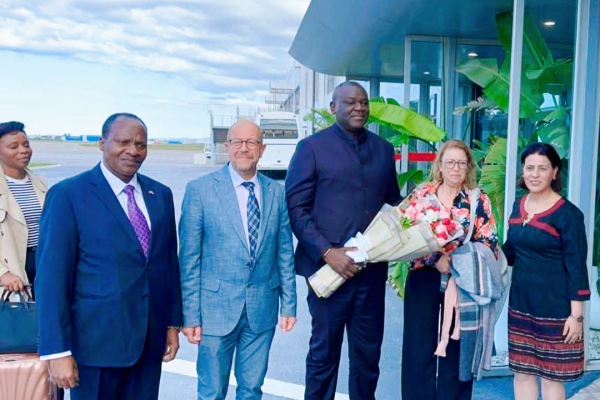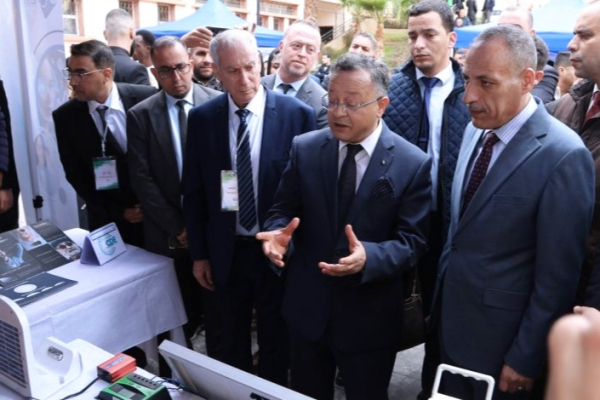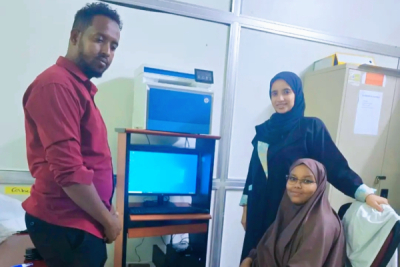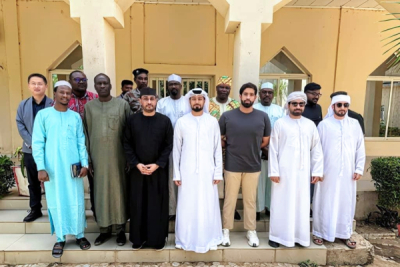- Augustin Kibassa Maliba began an official visit on April 22 to strengthen digital ties with Tunisia
- Key meetings include sessions with Tunisia’s Ministry of Communication Technologies, ICT Federation (UTICA), and the African Business Council (TABC)
- Discussions center on digital transformation, postal modernization, and entrepreneurship collaboration
Congolese Minister of Posts, Telecommunications and Digital, Augustin Kibassa Maliba, began an official visit to Tunis on Tuesday, April 22, as part of an ambitious initiative to bolster bilateral digital cooperation between the Democratic Republic of Congo and Tunisia.
During his stay, Minister Kibassa Maliba is scheduled for several key meetings, including a bilateral ministerial session at the Tunisian Ministry of Communication Technologies. He will also attend a presentation on the Ecom@Africa platform and postal services, and engage in discussions with the Tunisian ICT Federation (UTICA) and the Tunisian African Business Council (TABC).
The visit includes an immersive experience within the Smart Tunisian Technoparks (S2T) ecosystem, recognized for its programs supporting entrepreneurship and innovation, its research and training initiatives, as well as its internationalization strategies and networking of technological ecosystems.
A central focus of the discussions will be the proposed creation of a Technopark in Kinshasa, with the aim that exchanges with Tunisian digital stakeholders will lay the groundwork for enhanced technical collaboration. This mission aligns with a broader strategy by the Congolese government to structure an effective digital ecosystem, support local tech entrepreneurship, and connect the DRC to regional innovation hubs.
Tunisia has established itself as a significant technological player in Africa. According to the International Telecommunication Union’s (ITU) “Measuring Digital Development – Facts and Figures 2024” report, 92.8% of the Tunisian population uses the internet, a figure considerably higher than the global average of 70.5%. The country’s ICT Development Index (IDI) score is 77.2 out of 100, reflecting continuous progress.
In e-governance, the United Nations’ “UN E-Government Survey 2024: The Future of Digital Government” ranks Tunisia 87th globally (EGDI score: 0.6935), placing it third in Africa behind South Africa (0.8616) and Mauritius (0.7506).
Should these partnerships materialize, the DRC stands to gain from Tunisia’s expertise in digital governance, modernization of postal services, development of technological ecosystems, and support for entrepreneurial innovation. This collaboration would facilitate the transfer of skills in strategic sectors and expedite the digitization of postal services. It would also foster the implementation of joint projects, the sharing of best practices in integrating online public services, and the enhancement of the Congolese ecosystem’s connection to African digital and logistics networks.
By Samira Njoya,
Editing by Sèna D. B. de Sodji
- Algeria inaugurates rapid prototyping platform at Ouzera University
- The platform supports students with innovative projects, aligning with the national strategy to build a knowledge economy
- It features advanced tools including 3D printing, laser cutting, and modeling equipment
Algeria's Minister of Higher Education and Scientific Research, Kamel Baddari (photo, center), inaugurated a rapid prototyping platform at the University of Ouzera in Médéa province on Tuesday, April 22, aiming to empower students with innovative projects. The facility aligns with the national strategy to position universities as key drivers of the knowledge economy.
"The launch of this technological rapid prototyping platform enhances the outcomes of scientific research, provides students with an avenue to establish startups, and reinforces the strategic role of students in wealth generation and the advancement of the knowledge and innovation economy," Minister Baddari said during the inauguration ceremony.
Equipped with sophisticated modeling tools, laser cutting, and 3D printing capabilities, the platform expedites the design and production of functional prototypes. This offers project developers the chance to realize their concepts more swiftly while lowering manufacturing expenses. It bolsters a growing technological ecosystem within Algerian universities, following the recent introduction of a national cloud computing platform, a drone design and control system, and a university incubator focused on entrepreneurship and innovation.
This initiative is part of a broader push to support the entrepreneurial landscape in Algeria. In recent years, the government has expanded support mechanisms for young project holders through the establishment of support structures such as the National Agency for the Promotion of Incubators (ANPI), startup development centers across various regions, and funding mechanisms like the Algerian Startup Fund, which has been allocated several billion dinars.
Currently, Algeria has several hundred officially registered startups operating in crucial sectors including digital technology, fintech, healthcare, and smart agriculture. The development of technological platforms within universities, such as the one in Ouzera, further strengthens an environment conducive to the emergence of a generation of innovators capable of actively contributing to the country's economic diversification.
By Samira Njoya,
Editing by Sèna D. B. de Sodji
- The Central Procurement Office for Medicines (CAMME) finalized the national installation of mSupply software across all healthcare facilities.
- The system enhances drug stock management, traceability, and supply planning, aiming to reduce stockouts and medication losses.
Djibouti's Central Procurement Office for Medicines and Essential Supplies (CAMME) announced Monday, April 21, the completion of the mSupply software installation across all healthcare facilities nationwide. This milestone represents a significant advancement in the digitization of Djibouti’s health system, an initiative that began in 2022 with technical and financial support from partners, most notably the World Bank.
"Thanks to our management system, stock levels, drug traceability, and supply planning are now optimized, thereby strengthening the efficiency, transparency, and responsiveness of the national pharmaceutical system," CAMME stated.
This modernization effort addresses several key strategic challenges, including preventing stockouts, minimizing losses from expired medications, ensuring the efficient distribution of essential medicines, and securing the tracking of health product flows from the central procurement office to healthcare facilities.
The mSupply software, already utilized in approximately 30 countries globally, has demonstrated its effectiveness, particularly in resource-constrained environments. Its implementation in Djibouti is a component of the 2023–2027 National Pharmaceutical Policy rollout. This policy aims to sustainably improve access to essential medicines while guaranteeing their quality, traceability, and availability. The initiative is part of the broader Health System Strengthening Project, financed by the World Bank and underway since February 2023, with the overarching goal of ensuring improved healthcare access for the entire population.
As numerous African nations increasingly adopt digitization to modernize their healthcare systems, Djibouti is underscoring its ambition to leverage technology as a strategic tool for enhancing health system efficiency and ensuring the continuous availability of essential medicines.
By Samira Njoya,
Editing by Sèna D. B. de Sodji
As fintech solutions proliferate across Africa, Cape Town-based startup Happy Pay is carving out a niche with its simplified buy now, pay later (BNPL) service. The company differentiates itself by requiring no upfront deposit and eliminating hidden fees.
South African financial technology startup Happy Pay has developed a solution allowing users to divide their purchase costs into three equal, interest-free monthly installments. This service is directly accessible via the user's bank card or South African bank account, with no initial deposit required.
The company aims to enhance purchase affordability, particularly for online transactions, but also at select brick-and-mortar retail partners.
The Happy Pay application, available on both iOS and Android platforms – where it has garnered over 10,000 downloads according to Play Store metrics – features a user-friendly dashboard. This interface enables users to track upcoming payment dates, review completed payments, access transaction history, and monitor other relevant data. The registration process is streamlined, relying on an analysis of the user's monthly income.
Happy Pay implements a spending limit for its users. The fintech company states that factors such as payment frequency and overall financial well-being influence this limit. In its FAQs, Happy Pay explains that consistent, timely payments increase users’ spending limits. Established in 2021 and headquartered in Cape Town, the fintech was founded by Boitumelo Thulo, David Torr, Maps Maponyane, and Wesley Billett. Happy Pay recently announced a partnership with Peach Payments, an African payments firm, to bolster its expansion within the installment payment sector and simplify the integration of its solution into e-commerce platforms.
Happy Pay primarily targets salaried individuals with a consistent income who may lack access to conventional credit options. The company's objective is to address a growing consumer demand for greater budgetary flexibility and to assist merchants in boosting their sales conversion rates, especially in the online marketplace.
By Adoni Conrad Quenum,
Editing by Feriol Bewa
-
Chad is advancing plans to deploy a smart video surveillance system in its capital, N’Djamena, amid rising crime rates.
-
The system would use high-definition cameras with night vision and behavioral analysis software, connected via a fiber-optic network.
-
Authorities hope the system will help counter organized crime and terrorism, especially near key government sites.
Chad’s capital is moving closer to adopting a high-tech video surveillance system as authorities seek to address growing urban crime. On Thursday, officials from the Ministry of Public Security and Immigration met with international experts to discuss the deployment of an intelligent monitoring network tailored to N’Djamena’s security challenges.
The proposed system would rely on next-generation cameras featuring high-definition sensors, infrared night vision, and behavioral analysis software to detect unusual movements. These devices would be interconnected via a fiber-optic network, supported by reinforced poles, technical cabinets, backup power supplies, and redundant data storage to ensure uninterrupted operation.
The push for modernization follows a surge in criminal activity in N’Djamena since early 2025. If implemented, the system could enhance law enforcement’s ability to counter organized crime and terrorism while improving security around government buildings.
However, the project’s success hinges on key factors: a stable high-speed internet connection, public support, and safeguards to prevent potential overreach and privacy violations.
Chad is not alone in turning to smart surveillance. Neighboring Cameroon has already installed over 3,000 cameras under its Smart City initiative, with plans to expand to 5,000 nationwide. Similar projects in Nigeria, Kenya, and Morocco have also strengthened urban security in recent years.
Should Chad move forward, N’Djamena could join a growing list of African cities leveraging technology to combat crime—balancing safety with civil liberties in an era of digital policing.
By Samira Njoya,
Editing by Sèna D. B. de Sodji
Google has opened applications for the 2025 edition of its Startups Accelerator Africa program, a three-month initiative designed to support early-stage African tech startups leveraging artificial intelligence (AI) to address challenges across the continent.
The accelerator offers selected startups equity-free support, up to $350,000 in Google Cloud credits, expert mentorship from Googlers and industry leaders, and networking opportunities.
Eligible startups must be headquartered in Africa, have at least one African founder, offer a live product already in the market, and have an AI-first approach or meaningfully integrate AI into their operations. Applications are open until May 9, 2025.
The ICT Africa Summit 2025 is set to take place from April 21 to April 23 at the Palais des Expositions des Pins Maritimes in Algiers, bringing together industry leaders, startups, and innovators in a highly anticipated gathering that aims to shape the future of Africa’s digital landscape.
More than 100 startups will present their latest tech breakthroughs, and participants from over 12 countries will engage in discussions and demonstrations that reflect the fast-growing digital industry.
The summit is expected to attract over 8,000 visitors, including policymakers, investors, and industry experts, creating a dynamic environment for premium networking through exclusive B2B meetings.
Amid Egypt's rapid urbanization and increasing strain on resources, Bekia's digital solution delivers a community-focused, reward-based model for sustainable waste management.
Egyptian startup Bekia has developed an innovative digital platform that lets individuals and businesses exchange recyclable waste for goods and services. Founded in 2017 by Alaa Afifi, the Cairo-based company has secured $580,000 in funding across four investment rounds to fuel its expansion.
"Our platform primarily targets women in Egypt, since they typically manage household waste," Afifi said. "By empowering women, we aim to leverage their role in waste disposal to combat environmental issues caused by poor waste management."
Users can request waste pickup—including plastics, paper, metals, used oil, and electronics—via Bekia’s mobile app (available on iOS and Android with over 50,000 downloads on the Play Store) or website. In return, they earn credits redeemable for shopping vouchers, groceries, mobile airtime, or even school fees. The platform uses geolocation to integrate requests into an optimized logistics system operated by Bekia.
The startup tackles two major challenges: reducing poorly managed urban waste and incentivizing eco-friendly habits through tangible rewards. It focuses on underserved neighborhoods with limited public waste collection services, aiming to build a comprehensive recycling network.
With more than 75,000 users and hundreds of tons of waste collected, Bekia is emerging as a key green tech player in Egypt. The company is now expanding through partnerships with schools, government agencies, and businesses.
By Adoni Conrad Quenum,
Editing by Feriol Bewa
- Senegal plans national e-learning platform to train civil servants in digital skills
- Initiative discussed in April 18 meeting between Ministries of Digital Affairs and Civil Service
- Aims to enhance digital literacy, modernize tools, and integrate AI in public administration
The Senegalese government is exploring the creation of a national e-learning platform to provide continuous digital skills training for civil servants. Officials believe the initiative will help accelerate the country’s digital transformation—a central pillar of its socioeconomic development strategy in the coming years.
The platform’s development was among the key projects discussed during a joint meeting between the Ministry of Digital Affairs and the Ministry of Civil Service and Public Service Reform on April 18.
“This strengthened collaboration between our two ministries marks a crucial step in implementing the Technological New Deal and the President’s Vision 2050, which seeks to build an agile, inclusive, and user-focused administration—fully aligned with the Ministry of Civil Service’s reform priorities,” the Ministry of Digital Affairs said in a statement.
Improving civil servants’ digital literacy is a core objective of Senegal’s digital transformation policy. The government aims to bolster basic and intermediate skills to promote digital awareness and cultivate a proactive, sustainable digital culture within the public sector. Additional goals include modernizing tools through high-performance digital solutions, integrating artificial intelligence into administrative workflows, and establishing a structured system for monitoring, evaluating, and continuously upgrading skills.
This strategy aligns with recommendations from the Organisation for Economic Co-operation and Development (OECD). In its report Developing Skills for Digital Government: A Review of Good Practices Across OECD Governments, the OECD stresses that countries must invest in civil servants’ digital competencies to support the shift toward digital governance. The push comes as the World Bank estimates that nearly 230 million jobs in Sub-Saharan Africa will require digital skills by 2030. Senegal currently employs around 130,000 civil servants.
However, the OECD cautions that the success of such training initiatives depends on their design, delivery, and execution.
“Governments must first pinpoint the essential digital and complementary skills, then evaluate existing staff capabilities to identify gaps,” the organization advises. “This allows for targeted training programs that maximize available resources. Finally, they must assess the impact of these efforts to refine future initiatives.”
By Isaac K. Kassouwi,
Editing by Sèna D. B. de Sodji
Moroccan authorities consider digital technology a key driver of socioeconomic development. This priority spans all sectors, including entrepreneurship.
The Moroccan government and Swedish technology firm Ericsson have announced plans to collaborate on equipping Moroccan entrepreneurs with crucial digital skills. This vision was formalized through the signing of a memorandum of understanding (MoU) on the sidelines of the third edition of Gitex Africa, held in Marrakech from Monday, April 14, to Wednesday, April 16.
Under the MoU, the two entities will explore various ways for Moroccan entrepreneurs and small businesses to leverage Ericsson’s global educational initiatives. A key resource is the Ericsson Educate platform, which offers extensive online learning content covering vital areas such as 5G technology, artificial intelligence (AI), machine learning (ML), the Internet of Things (IoT), automation, cloud computing, and general telecommunications principles.
The overarching goal for the Moroccan government is to furnish entrepreneurs with the “skills in demand for Morocco’s growing digital economy.” This initiative has the potential to align with Axis 2 of the "Morocco Digital 2030" digital transformation strategy, which aims to digitize the nation's economic structure to enhance productivity. Government plans include establishing a foundation for business digitalization, supporting the growth of Moroccan tech small and medium-sized enterprises (SMEs), and aiding micro and small businesses in their own digital transformations. Through widespread digitalization, the government anticipates adding 100 billion dirhams (approximately $10.8 billion) to the national Gross Domestic Product (GDP) by 2030.
However, the article notes that beyond skills acquisition, Moroccan companies may face several hurdles in their digital transition. The Organisation for Economic Co-operation and Development (OECD) has highlighted challenges such as limited internal resources, financial constraints, and restricted access to reliable, fast, and affordable digital infrastructure. The OECD points out that “access to fast broadband, which is essential for businesses to fully leverage digital transformation and harness the potential of advanced applications, remains uneven between urban, rural, and remote areas.”
It is crucial to note that the agreement between the Moroccan government and Ericsson is currently a non-binding memorandum of understanding. This document signifies an intention to collaborate, with specific terms and conditions to be determined through future discussions. The signing of a definitive partnership agreement and the subsequent implementation of planned actions will provide a clearer picture of the potential outcomes and impact of this collaboration.
By Isaac K. Kassouwi,
Editing by Sèna D. B. de Sodji
More...
The digital economy is now a major engine of growth for many African nations. This ongoing transformation is creating opportunities for various players to emerge. The Democratic Republic of Congo, in particular, still holds considerable potential for expansion in this sector.
Orange Group officially commenced construction of its future headquarters in the Democratic Republic of Congo (DRC) on Wednesday, April 16, 2025, in a ceremony attended by Augustin Kibassa Maliba, the nation's Minister of Posts, Telecommunications, and the Digital Economy. The move underscores the telecom operator's commitment to a market brimming with potential. This significant investment reflects the company's confidence in the DRC's economic and digital prospects, despite a business climate often perceived as intricate.
The planned eight-story Orange DRC headquarters, a 10,000-square-meter edifice, will rise in Kinshasa on Avenue des Huileries, directly across from the Martyrs of Pentecost Stadium in the Lingwala district. “The construction of this headquarters goes beyond just a building; it represents a major step forward for the technological development of the DRC. I hope this site will offer a modern, collaborative work environment that fosters innovation and the creation of new services to benefit the entire Congolese population,” said Minister Kibassa Maliba.
According to the latest figures from Congo’s Postal and Telecommunications Regulatory Authority (ARPTC), Orange is the country's second-largest operator with 18.5 million subscribers, trailing Vodacom's 22.5 million but ahead of Airtel and Africell. With a total of 62.2 million mobile phone subscribers, representing a mobile penetration rate of 65.8%, and 32.1 million mobile internet users, equating to an internet penetration rate of 33.8%, DRC presents a market with substantial untapped potential.
The Congolese government's active pursuit of digital transformation as a key driver of economic and social advancement further highlights the opportunities that Orange envisions within the nation. The company has considerable scope to establish itself as a leading player across various burgeoning sectors, including the expanding innovative startup ecosystem, the digitization of both public and private services, cloud computing, data storage solutions, and cybersecurity.
Mobile Money also stands out as a robust growth engine with significant promise for the telecom operator. With a current penetration rate of 26.7%, Orange possesses the potential to become a catalyst for greater financial inclusion. However, the company's ability to capitalize on these favorable projections hinges on the Congolese government's sustained commitment to nurturing the digital economy, particularly in areas such as regulatory frameworks, frequency spectrum allocation, infrastructure development, the issuance of new licenses, and improving access to mobile devices. Moreover, political and security stability within the country remains a critical factor.
The future Orange headquarters in the Democratic Republic of Congo is slated for completion and handover in October 2027.
By Muriel EDJO,
Editing by Sèna D. B. de Sodji
To further its goal of becoming a leading telecom operator throughout its African markets, Orange is increasing its efforts. The company is significantly investing in new technologies and prioritizing stronger customer relationships.
Orange Middle East and Africa (OMEA) deployed more than 10,000 employees across its 17 markets on Tuesday, April 15, in a widespread local customer service initiative. The operation, dubbed “My Customer, My Boss,” saw staff from all departments engaging directly with 15,000 customers in 120 towns and villages.
OMEA presented the effort as a significant step in the company’s management culture, inspired by a successful program in Sierra Leone. The initiative aims to empower every employee, regardless of their role, to contribute to customer satisfaction.
Brelotte Ba, Deputy CEO of Orange Middle East and Africa, underscored the importance of the initiative, stating, “Customer experience is everyone’s business. Every employee, without exception, is committed to meeting our customers’ expectations with excellence. With My Customer, My Boss, we are demonstrating that our commitment to service is collective, concrete, and forward-looking by organizing, for the first time on a continental scale, a collective mobilization of this magnitude.”
To streamline data collection during the outreach, Gofiled, a startup from the Orange Digital Center in Tunisia, developed a mobile application. OMEA highlighted this collaboration as an example of its commitment to integrating local innovation, social impact, and economic performance. The data gathered from individual customers, businesses, Orange Money users, and partners will be analyzed and used to drive concrete actions identified during internal hackathons in each country. These efforts are geared towards developing solutions that enhance the customer experience.
The focus on service quality and customer experience comes as competition in Africa’s telecom market has intensified over the past three decades. With telecom operators now closely matched in areas such as network coverage, new technologies, service offerings, and pricing, customer sentiment has become a critical factor in customer retention.
According to an analytical note from the international strategy consulting firm McKinsey & Company, customer experience is currently “the key differentiator for creating value in telecommunications. Our research shows that 73% of senior telecom executives consider it a top priority.”
OMEA stated that this large-scale mobilization of staff for local customer service missions “is set to become an annual event. It is part of a continuous improvement approach to customer experience, aimed at assessing satisfaction, understanding expectations, and continuing to improve the services offered to them.”
At GITEX Africa 2025 in Marrakesh, Morocco's Minister of Health and Social Protection, Amine Tehraoui, announced the launch of GITEX Future Health Africa/Morocco. This event aims to accelerate the digitization of Africa's healthcare industry.
Scheduled for April 21–23, 2026, in Casablanca, it will feature GITEX DIGI_HEALTH, focusing on leveraging AI and digital technologies to address challenges in healthcare information, delivery, access, and efficiency.
The three-day event will include a leadership summit targeting decision-makers from hospitals, healthcare institutions, and government bodies, focusing on themes such as health infrastructure, expanded access to healthcare, investment, data security, and AI-powered diagnostics.
The collaboration is a strategic move to empower Moroccan entrepreneurs, bridge the digital skills gap, and drive sustainable economic growth per the nation's Digital 2030 objectives.
At GITEX Africa 2025 (April 14-16), held in Marrakesh, Morocco's Ministry of Economic Inclusion, Small Business, Employment and Skills (MIEPECC) and Ericsson signed a Memorandum of Understanding (MoU) to explore collaboration aimed at digitally upskilling and empowering entrepreneurs in the Kingdom of Morocco.
Younes Sekkouri, Minister of Economic Inclusion, Small Business, Employment and Skills (MIEPECC), stated, "This potential collaboration with Ericsson reflects our shared interest in enhancing digital inclusion in Morocco. We look forward to exploring how such an initiative could help strengthen our entrepreneurial ecosystem and support the ambitions of Morocco’s Digital 2030 Agenda."
The initiative seeks to provide Moroccan entrepreneurs and small businesses with access to Ericsson's global educational programs, fostering in-demand digital skills essential for the nation's evolving digital economy. The collaboration aligns with MIEPECC's broader vision of promoting economic inclusion and supporting small businesses through accessible digital transformation initiatives.
Majda Lahlou Kassi, President of Ericsson Morocco and Vice President and Head of Ericsson West and Southern Africa, expressed enthusiasm about the partnership, emphasizing the role of Ericsson's global expertise and digital learning platforms in supporting the capacity building and upskilling of Moroccan small enterprises and startups.
This collaboration underscores a mutual commitment to developing inclusive and sustainable pathways for digital transformation and economic opportunity in Morocco, in line with the country's ambitious Digital 2030 Agenda.
Morocco's Digital 2030 Strategy aims to transform the nation into a leading digital economy in Africa by creating 240,000 jobs in the digital sector and launching 3,000 startups by 2030. However, a significant challenge remains: the shortage of skilled professionals in key areas. By leveraging Ericsson's global educational programs, this partnership aims to equip entrepreneurs and small business owners with essential digital skills, thereby enhancing their competitiveness in the digital economy.
Hikmatu Bilali















